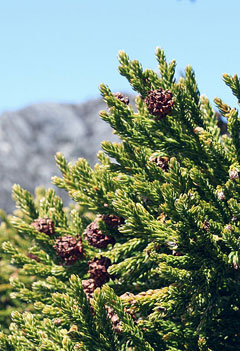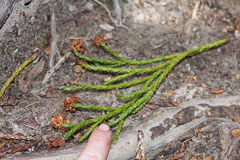 |
|
http://www.flickr.com/people/65749227@N00 |
 |
| http://www.flickr.com/people/93452909@N00 |
Translate this page:
Summary
Physical Characteristics

 Athrotaxis selaginoides is an evergreen Tree growing to 30 m (98ft) by 6 m (19ft) at a slow rate.
Athrotaxis selaginoides is an evergreen Tree growing to 30 m (98ft) by 6 m (19ft) at a slow rate.
See above for USDA hardiness. It is hardy to UK zone 8. It is in leaf all year, and the seeds ripen from September to October. The species is monoecious (individual flowers are either male or female, but both sexes can be found on the same plant) and is pollinated by Wind.
Suitable for: light (sandy), medium (loamy) and heavy (clay) soils and prefers well-drained soil. Suitable pH: mildly acid, neutral and basic (mildly alkaline) soils. It can grow in semi-shade (light woodland) or no shade. It prefers moist soil.
UK Hardiness Map
US Hardiness Map
Synonyms
A. gunneana. Cunninghamia selaginoides.
Plant Habitats
Woodland Garden Canopy;
Edible Uses
References More on Edible Uses
Medicinal Uses
Plants For A Future can not take any responsibility for any adverse effects from the use of plants. Always seek advice from a professional before using a plant medicinally.
None known
References More on Medicinal Uses
The Bookshop: Edible Plant Books
Our Latest books on Perennial Plants For Food Forests and Permaculture Gardens in paperback or digital formats.

Edible Tropical Plants
Food Forest Plants for Hotter Conditions: 250+ Plants For Tropical Food Forests & Permaculture Gardens.
More

Edible Temperate Plants
Plants for Your Food Forest: 500 Plants for Temperate Food Forests & Permaculture Gardens.
More

More Books
PFAF have eight books available in paperback and digital formats. Browse the shop for more information.
Shop Now
Other Uses
Wood
Wood - very durable, easily worked. A softwood with a pleasant cedar scent, it is highly valued for many uses[167].
Special Uses
References More on Other Uses
Cultivation details
Requires a sheltered position in a rich moist soil[1]. Plants are not very hardy in most areas of Britain, though they succeed outdoors in the south and west of the country, producing fertile seed in W. Britain[200]. A very slow growing species[167], trees can succeed in the southern part of Britain but the best growth is found in wetter areas such as Cornwall and Ireland[185].
References Carbon Farming Information and Carbon Sequestration Information
Temperature Converter
Type a value in the Celsius field to convert the value to Fahrenheit:
Fahrenheit:
The PFAF Bookshop
Plants For A Future have a number of books available in paperback and digital form. Book titles include Edible Plants, Edible Perennials, Edible Trees,Edible Shrubs, Woodland Gardening, and Temperate Food Forest Plants. Our new book is Food Forest Plants For Hotter Conditions (Tropical and Sub-Tropical).
Shop Now
Plant Propagation
Seed - sow February/March in a cool greenhouse. When they are large enough to handle, prick the seedlings out into individual pots and grow them on in the greenhouse for at least their first winter. Plant them out into their permanent positions in late spring or early summer, after the last expected frosts[78]. Cuttings of mature wood of the current season's growth, 7 - 10cm long in early autumn (October), in sandy soil in a cold frame. Leave for 12 months[78].
Other Names
If available other names are mentioned here
Native Range
AUSTRALASIA: Australia (Tasmania)
Weed Potential
Right plant wrong place. We are currently updating this section.
Please note that a plant may be invasive in one area but may not in your area so it's worth checking.
Conservation Status
IUCN Red List of Threatened Plants Status :

Growth: S = slow M = medium F = fast. Soil: L = light (sandy) M = medium H = heavy (clay). pH: A = acid N = neutral B = basic (alkaline). Shade: F = full shade S = semi-shade N = no shade. Moisture: D = dry M = Moist We = wet Wa = water.
Now available:
Food Forest Plants for Mediterranean Conditions
350+ Perennial Plants For Mediterranean and Drier Food Forests and Permaculture Gardens.
[Paperback and eBook]
This is the third in Plants For A Future's series of plant guides for food forests tailored to
specific climate zones. Following volumes on temperate and tropical ecosystems, this book focuses
on species suited to Mediterranean conditions—regions with hot, dry summers and cool, wet winters,
often facing the added challenge of climate change.
Read More
Expert comment
Author
D.Don.
Botanical References
11200
Links / References
For a list of references used on this page please go here
Readers comment